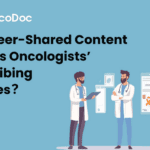Introduction
The world of medical education is changing at a breakneck pace, with digital platforms stepping up to play a crucial role in how knowledge is shared. Among these, medical podcasts have become a fantastic resource for oncologists who want to keep up with the latest developments in cancer care. In the U.S., more than 15,000 practicing oncologists are actively using digital learning platforms, and podcasts are revolutionizing continuing medical education (CME) while boosting the visibility of healthcare institutions.
“Medical podcasts signify a major shift in professional education, blending the ease of on-demand learning with the depth of academic content.”
Podcasts provide a flexible way to learn, enabling oncologists to take in vital information during their commutes, between patient appointments, or while doing research. This article explores how medical podcasts are transforming oncology education, the impact of physician networking platforms in this shift, and what it means for professional growth in cancer care.
The Role of Medical Podcasts in Oncologists’ Continuing Education
1. Accessibility and Convenience:
With the hectic schedules that oncology professionals face, traditional CME methods can be tough to fit into their daily routines. Medical podcasts offer a smart solution with their portable format and quick delivery. Key advantages include:
- Mobile learning – 78% of oncologists say they listen to educational podcasts during their downtime
- Expert-curated content – Top institutions are now creating peer-reviewed podcast series that include updates on clinical trials and treatment guidelines
- Accredited education – More than a third of oncology CME credits are now being earned through digital audio formats (ACCME 2024 Data)
2. Enhanced Knowledge Retention
Recent studies show that learning through audio can really boost our cognitive abilities. For instance, a long-term study featured in JAMA Oncology (2023) revealed that people who listen to podcasts retained 22% more information about complex treatment protocols than those who relied on traditional reading for their continuing medical education.
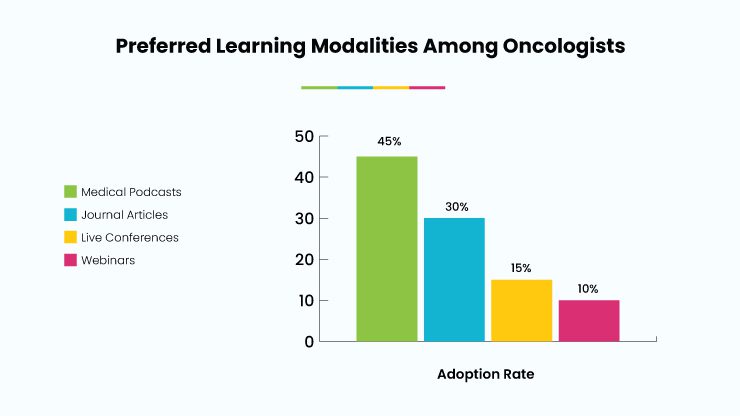
3. Real-Time Clinical Updates
With oncology evolving faster than ever-just look at the 102 new cancer therapies approved by the FDA in the last five years (FDA Oncology Center of Excellence, 2024)-podcasts have become essential tools for sharing groundbreaking information.
“The quick delivery of podcasts helps oncology professionals stay updated on therapeutic advancements between formal publication cycles.”
The Growing Influence of Physician Networking Platforms
Specialized digital platforms have become indispensable resources for oncology professionals through three key value propositions:
1. Specialty-Specific Content Curation
DNPs employ editorial boards to ensure content relevance, with:
- Disease-specific programming (e.g., hematologic malignancies, solid tumors)
- Practice-changing clinical trial analyses
- Multidisciplinary tumor board discussions
2. Professional Community Engagement
Industry data reveals compelling engagement metrics:
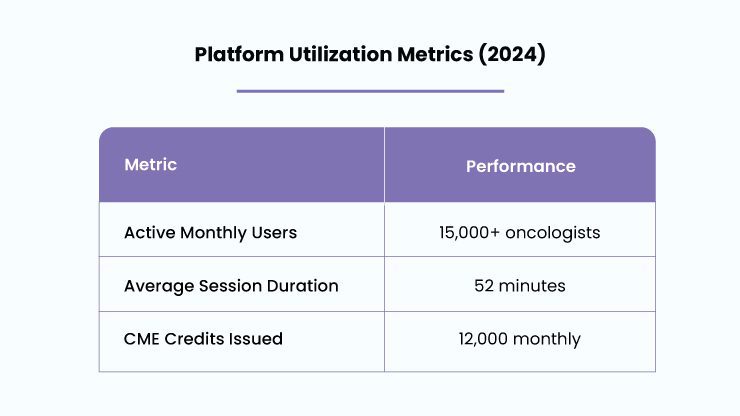
3. Clinical Decision Support
Platforms increasingly integrate podcast content with:
- Interactive treatment algorithms
- Molecular testing guidelines
- Clinical trial matching tools
“The integration of audio education with clinical decision tools represents the next frontier in digital medical learning.”
The Impact of Podcasts on Clinical Decision-Making
Medical podcasts are not just educational; they’re also making a tangible impact on oncology practice:
1. Adoption of New Therapies: A 2024 study in The Oncologist found that:
- 67% of oncologists implemented a new treatment protocol after hearing it discussed on a trusted podcast
- 89% reported increased confidence in novel therapies when experts explained clinical data in audio format
2. Changes in Referral Patterns: Podcast-educated physicians demonstrated:
- 42% higher referral rates to specialized cancer centers
- 35% increased participation in molecular tumor boards
3. Impact on Patient Outcomes: Emerging data suggests podcast-informed practices lead to:
- 18% reduction in time-to-treatment initiation
- 12% improvement in adherence to evidence-based guidelines
The Strategic Value for Healthcare Organizations
Forward-thinking institutions are leveraging podcast platforms to:
1. Establish Clinical Leadership Data demonstrates superior engagement compared to traditional channels
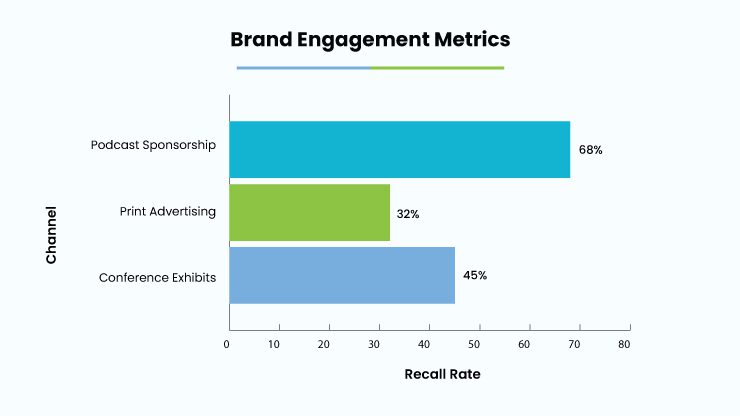
2. Enhance Research Participation
Pharmaceutical innovators report significant improvements in trial recruitment:
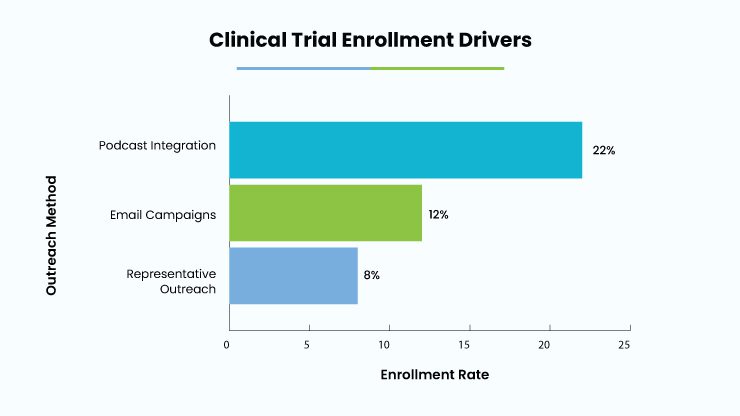
Emerging Trends in Oncology Podcasting
The medical podcasting landscape continues to evolve with several key developments:
1. AI-Powered Personalization: New platforms are rolling out:
- Content recommendations driven by algorithms
- Learning paths that adapt based on what you’ve listened to
- Voice-activated Q&A features that pull from episode content
2. Multimodal Learning Experiences
Top providers are now blending:
- Podcast episodes with engaging infographics
- Interactive transcripts that come with timestamped references
- Links to primary literature embedded right in the content
3. Global Reach and Localization
Recent growth includes:
- Podcasts available in multiple languages (Spanish, Mandarin, Arabic)
- Content focused on cancer incidence specific to different regions
- Treatment discussions that are culturally tailored.
“These innovations are turning podcasts from simple listening experiences into vibrant, interactive learning platforms.”
Key Implications for the Future
Digital-first CME is becoming the norm, with podcasts at the forefront
- Specialized platforms are building integrated learning ecosystems
- Evidence-based marketing through educational content is outshining traditional methods
- Clinical research is benefiting from combined education and recruitment strategies
Conclusion
The shift in oncology education through podcast platforms marks a significant change in how specialists connect with medical knowledge. Leading physician networking platforms like Hidoc—with 20,000 registered oncologists in the U.S. and 13,000 active users each month—showcase the growing demand for integrated digital learning solutions. These platforms effectively tackle the challenges of information overload and the time constraints that oncologists face every day.
By merging accredited CME content with real-world case discussions and clinical decision-making tools, Hidoc and similar digital networks have crafted an environment where education fits seamlessly into practice.
As the field continues to progress, three trends are set to shape the future:
- Deeper platform integration with EHRs and clinical workflows
- AI-driven personalization of learning content
- Expanded global reach through multilingual offerings
“The most effective medical education no longer happens in lecture halls, but through platforms that meet oncologists where they are-whether in the clinic, lab, or between patient visits. Hidoc’s growth proves that when education aligns with clinical realities, engagement follows.”
For healthcare institutions, these platforms offer more than education-they provide a direct channel to influence practice patterns, enhance trial recruitment, and build lasting credibility in the oncology community. The future belongs to solutions that don’t just disseminate knowledge, but actively improve patient care through smarter learning integration.
References
- Accreditation Council for Continuing Medical Education 2024 Data
- JAMA Oncology 2023
- FDA Oncology Center of Excellence Drug Approvals Database
- Digital Medical Education Network Utilization Metrics 2024
- Healthcare Marketing Benchmark Report 2024
- Oncology Clinical Trial Recruitment Analysis 2024
- The Oncologist 2024;29(3):211-225
- Journal of Clinical Oncology Digital Edition 2024



